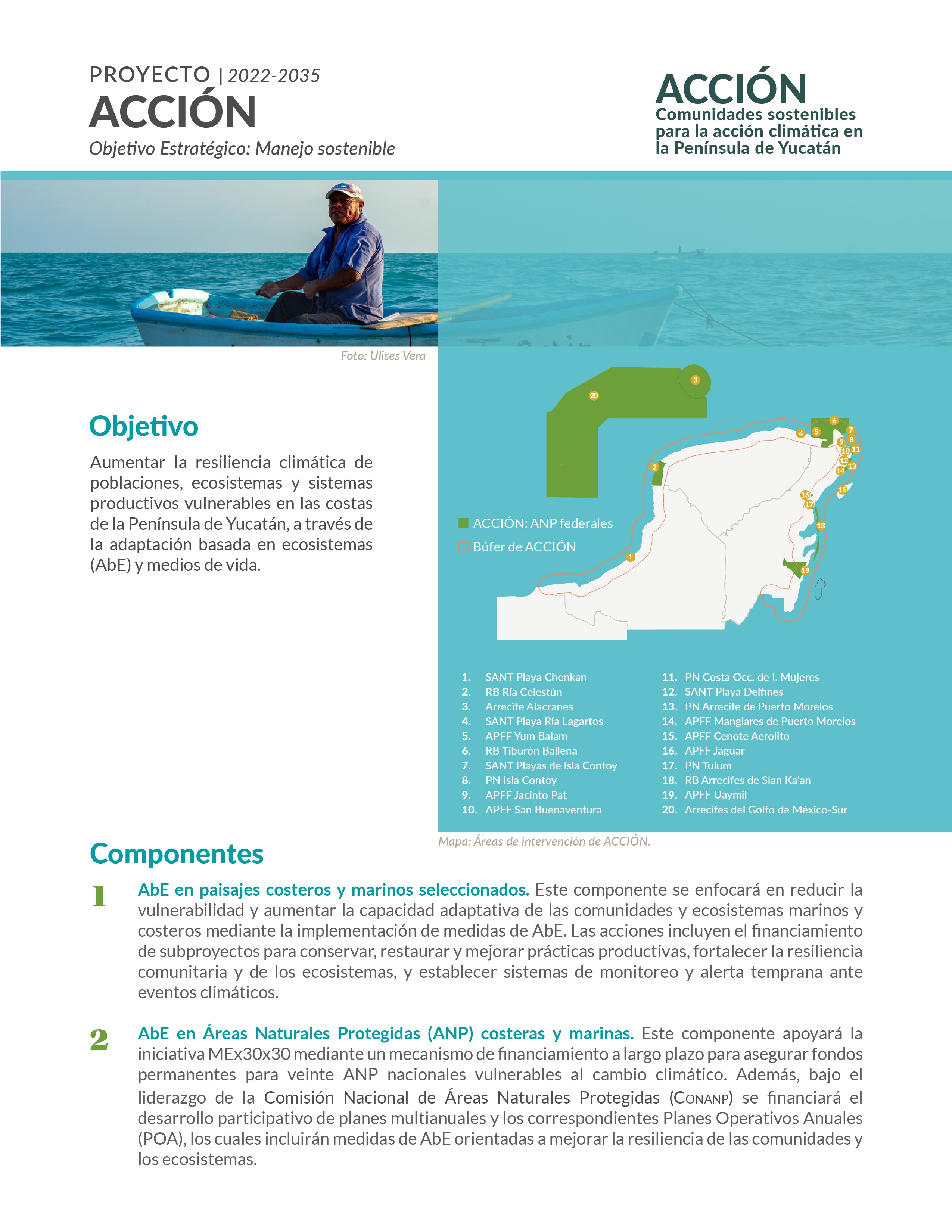ACCIÓN
Strengthening climate resilience in coastal communities of the Yucatán Peninsula
The Project
The Sustainable Communities for Climate Action in the Yucatán Peninsula (ACCIÓN) project seeks to increase the climate resilience of vulnerable communities, ecosystems, and productive systems on the coasts of the Yucatan Peninsula through ecosystem-based adaptation (EbA) and sustainable livelihoods.
Context
ACCIÓN is a project based on30 years of experience by Mexican Fund for the Conservation of Nature (FMCN, acronym in Spanish) in marine-coastal issues. It has been proposed for financing by the Green Climate Fund (GCF). The project is currently in the design phase and is expected to be implemented in 2025-2035.
The lines of work (components) that guide ACCIÓN activities are:
- EbA on selected coastal and marine landscapes: this component will focus on reducing the vulnerability and increase the adaptive capacity of marine and coastal communities and ecosystems by implementing EbA measures. Actions will include financing subprojects to conserve, restore, and improve productive practices, strengthening community and ecosystem resilience, and establishing early warning systems and monitoring for climate events.
- EbA on coastal and marine Protected Areas (PAs): this component will support the MEx30x30 initiative through a long-term financing mechanism to secure permanent funds for twenty national PAs vulnerable to climate change. Additionally, under the leadership of the National Commission of Natural Protected Areas (CONANP, acronym in Spanish), the participatory development of five-year plans and associated Annual Operating Plans (POAs, acronym in Spanish) will be financed. These plans will include EbA measures aimed at enhancing the resilience of both communities and ecosystems. Furthermore, funding will complement the implementation of these activities by developing protocols for monitoring and collecting data on ecological conditions and vulnerability in the PAs.
- Sustainable financing for scaling up EbA measures: this component will focus on securing sustainable financing for long-term EbA implementation. It will work on developing diverse financial mechanisms, including access to new markets, innovative funding sources, and parametric insurance for fishers. It will also support local producer groups and cooperatives in accessing investment opportunities and strengthening their financial capacity.
- Knowledge management and coordination with existing regional public policies and initiatives: this component will promote knowledge management and coordination between various actors and regional public policies. Coordination mechanisms will be developed and strengthened with multiple actors to facilitate the planning and implementation of EbA measures. Knowledge exchange and the creation of a learning community on EbA activities in coastal and marine areas, with an inclusive and gender-sensitive approach, will also be promoted.
ACCIÓN is currently in the design phase and is expected to be implemented in 2025-2035.
In September 2024, ACCIÓN was formally submitted to the GCF for approval.
Achievements
In the first half of 2024, the ACCIÓN project achieved significant progress. Eighteen pre-feasibility analyses and assessments were completed, providing valuable information for its design. The results of these studies are available here. The proposal was presented to key stakeholders in the Yucatán Peninsula, where 296 people participated in 27 consultation exercises, resulting in a positive response from local communities. In June 2022, the execution of resources from the Project Preparation Facility (PPF) was completed within the planned timeframe, consolidating the foundation for the future implementation of the project, scheduled for the 2025-2035 period.
In September 2024, ACCIÓN was formally submitted to the GCF for approval.

Allies
- Mexican Fund for the Conservation of Nature (FMCN, acronym in Spanish)
- Sureste Sostenible A. C. (SSAC, acronym in Spanish)
- Ministry of Environment and Natural Resources (Semarnat, acronym in Spanish)
- National Commission of Natural Protected Areas (Conanp, acronym in Spanish)
- Subnational governments of Campeche, Quintana Roo, and Yucatan
Analysis and diagnostics for the preparation of the project
Access the videos and documents that present the results of the analyses and diagnostics carried out for the preparation of the ACCIÓN project